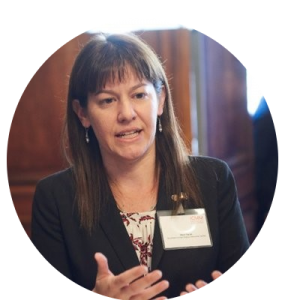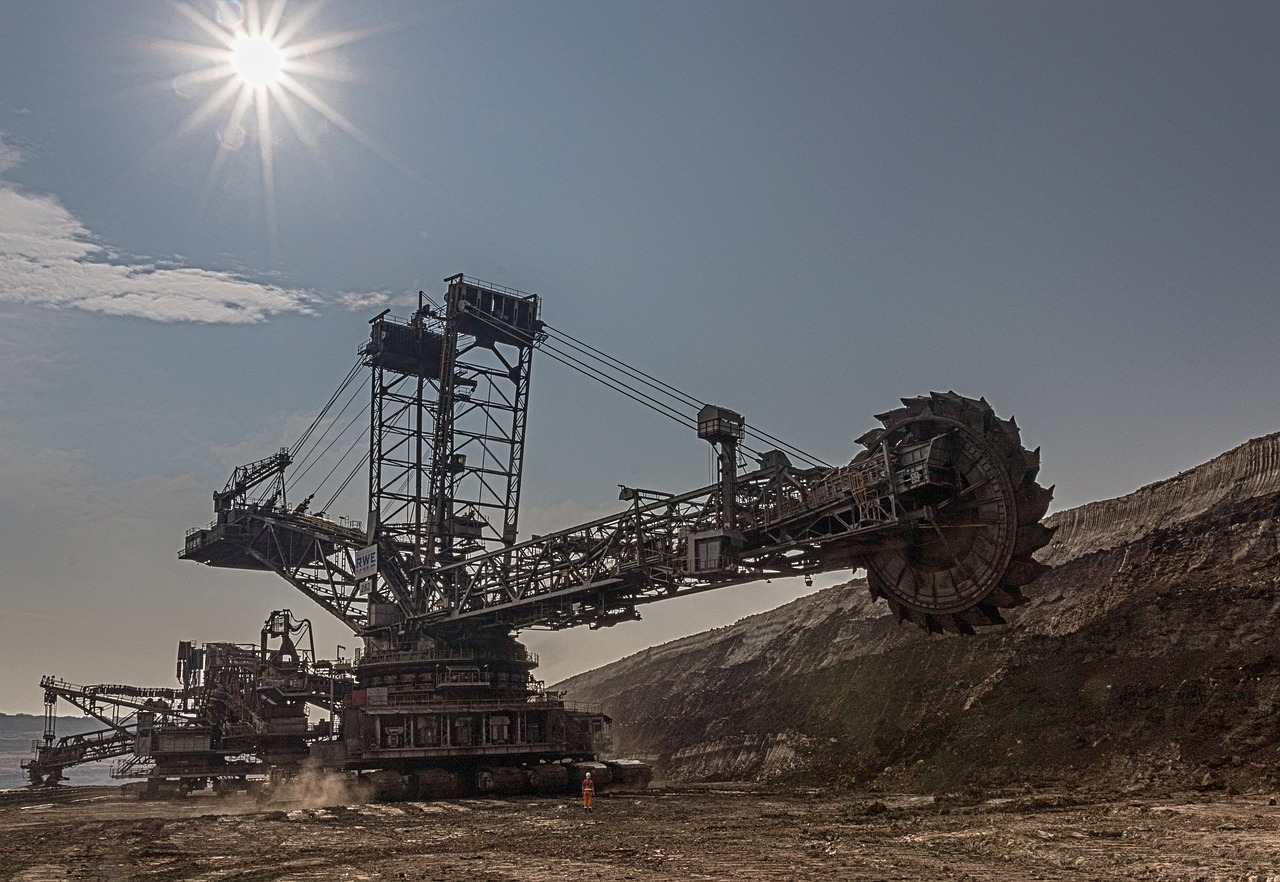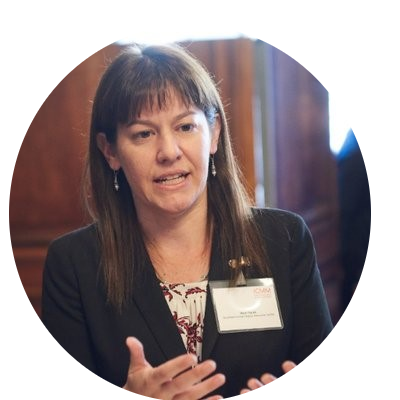Understanding the Business and Human Rights Agenda: A Conversation with Marti Flacks

Given the rapid expansion and transformation of the business and human rights landscape, it is important to understand what progress has been made, but also what gaps remain, in ensuring business enterprises protect, remedy, and respect human rights. To help understand the current state of the business and human rights space, we talked to Marti Flacks, the Deputy Director and Head of the North America Office for the Business and Human Rights Resource Centre, a leading organization in the field that engages governments, companies, the media, NGOs, and civil society and communities to empower human rights advocates, strengthen corporate accountability, and build corporate transparency.
How did you get into this field of work, specifically focusing on the intersection of human rights and business?
I worked in the US government for about 10 years mainly focused on Africa and energy issues. So I saw firsthand the impacts and influence businesses have on people’s lives and the opportunity the private sector provides in terms of inclusive economic growth, promotion of good governance, and human rights at its best.
But I also became aware of how a business can contribute to a destructive human rights environment or directly undermine human rights through its own operations. I saw both sides of the coin especially through years of working on a variety of issues from the conflict in Sudan and the impact of the oil industry on that conflict to some of the exciting public-private partnership initiatives that came out of the US government like the Power Africa Initiative.
When I left government, I thought about who the influential actors are and where it would be interesting and exciting to push the envelope around human rights issues—and I think there’s a real opportunity for businesses to do even more than they’re already doing in terms of human rights impact. And so, the Business and Human Rights Resource Centre seemed like an organization worth this investment and one that could potentially have a great impact in this field.
Can you talk a little more about the Business and Human Rights Resource Centre and the work it does?
To provide some additional context and understand the space in which the Business and Human Rights Resource Centre works, it’s important to note that the modern approach to business and human rights really has emerged and grown over the last 10 to 15 years. The movement really started with the UN Guiding Principles on Business and Human Rights that established a global framework for the role of business in respecting human rights. The UN Guiding Principles were then endorsed by the UN Human Rights Council in 2011, and over time have gained a lot of momentum and standing internationally.
The Business and Human Rights Resource Centre grew out of that same era. We’re about 16 years old and were a part of those very early conversations about the key issues in business that impact human rights and what behavior in companies either promotes or undermines human rights. The organization started out, as our name suggests, as a resource center for people interested in business and human rights.
And we’ve expanded from that function in the global human rights and business movement. We continue to focus on transparency and serve as a resource for advocates for human rights and we track human rights policies and the performance of over 8,000 companies around the world across 180 countries, and make that information available with different constituents. We also promote corporate accountability and help communities and local NGOs to get companies to address human rights concerns when they arise.
Typically, we take up about 400 allegations of abuse each year, which come either from our local partners, media reports, or from NGO reports. We take those directly to companies and we give the companies an opportunity to respond to those allegations, and then we post the allegation and the response together on our website, to provide a comprehensive look at the situation. We get a response from companies almost 75% of the time, globally so it’s a really effective tool to promote company engagement and to really start a dialogue both between companies and civil society, but also inside companies where they’re being asked questions about these issues.
And then the last thing we do, that’s probably the most important is trying to empower advocates for human rights. We consider advocates to be those from civil society, governments, within companies themselves, and among investors who are advocating for improved respect for human rights and trying to change company policy or company performance. We try and create tools and resources for those advocates to make the case and to do their jobs more effectively which ranges from at the very local level to the global level.
From your perspective, to date, what has the Extractive Industries Transparency Initiative accomplished with regards to human rights concerns? What gaps remain and what more can be done under this initiative?
The Extractive Industries Transparency Initiative (EITI) was founded to tackle a very specific problem within extractive industries: corruption that emanates from the very large transfers of money specifically from companies to governments related to the oil and gas and minerals that they’re extracting. The idea of the EITI was to increase transparency around those financial flows to give advocates a more effective tool to tackle that corruption. Over the past 17 years, EITI has made a lot of progress in increasing transparency around those financial payments. More importantly, EITI has increased the understanding and awareness among stakeholders about what payments in this sector should look like and why transparency is important.
What became clear over time as EITI began to be implemented in more and more countries is that the financial flows and numbers are only one piece of a much bigger puzzle that affects the sector. What supporters and advocates of EITI have done a good job at over the years is adapting the initiative to tackle that broader set of issues.
Now, EITI reporting is no longer just about the dollar figure. It’s about the structure of the sector itself and what production, contracts, the operating environment, and ownership of companies looks like. I give EITI and its members a lot of credit for recognizing the need to adapt to a more holistic picture and continuing to evolve EITI over the years especially as we’ve had other multi-stakeholder initiatives that haven’t been able to adapt as effectively.
One area EITI continues to face a challenge concerns the usability of data and empowering people to take that data and find avenues of remedy and accountability when they have issues. But at the same time one of the things that’s great about EITI is that it’s been incredibly effective at creating global norms and standards.
Something that comes to mind with initiatives like EITI is whether they are examining the impact of industries on individuals based on their identity, including their gender. Thus, my next question is: how does the extractive industry itself impact people because their gender and is EITI or any other initiative working to address this impact?
It’s a great question and before I get to it will point out that EITI does not call itself a human rights initiative and wouldn’t describe itself that way. However, the work it does can have an impact on human rights. EITI has taken some steps in transparency and good governance with regards to its impact. For example, countries now report on job creation through the extractive industries.
EITI also now has something that’s really important to us which is a much more robust policy on human rights defenders and what it means for civil society in a particular country to be able to freely participate in the EITI process and in advocacy around the extractive industries. So, EITI has started to delve into analysis of impact but they’re not looking specifically at the human rights impacts of any particular mining project. And I don’t know if EITI will go there but I think there’s a real need in the mining industry and extractive industries for stronger international standards around human rights impact.
There haven’t been too many industry initiatives focused on the impact of industry on human rights but there are a few multi-stakeholder initiatives that are. One is called the Initiative for Responsible Mining Assurances (IRMA). Some of these initiatives are purely industry related and a lot of them are focused on specific minerals, but none of them have that kind of global or even multi stakeholder buy-in that something like EITI has. So for me, that’s still a gap in the industry that that needs to be tackled.
To come back to your question then on gender I would say it is something that the EITI recently acknowledged publicly with some statements on gender impacts of the extractive industries and encouraged their members to report on those disparate impacts. And it’s something that I think is gaining more recognition among the extractive industries. There’s an increasing focus on gender inclusiveness and accessibility, especially accessibility to remedy, and understanding disparate impacts on human rights based on gender.
In the future, where will we continue to see more challenges with respect to human rights and business? And what can businesses as well as organizations like yours do in response?
The global economy now has companies with very long supply chains so they’re sourcing from many different materials, regions, and countries and they’re managing different inputs. There’s an expectation both under the UN Guiding Principles, but also increasingly under national laws that companies account for the materials and the inputs in their supply chains. This includes oversight of raw materials production and how workers in those supply chains are treated (i.e. in factories). Thus, we’ve seen some legislation pass that mandates transparency starting with the California Transparency and Supply Chains Act, the UK Modern Slavery Act (which requires companies to actually disclose efforts they’re making to prevent forced labor and modern slavery in their supply chains).
Additionally, several governments are actually mandating human rights due diligence for companies’ supply chains and I think that’s a really interesting development that could change how companies think about their human rights responsibilities. The other thing that is also very positive is the role that investors are increasingly playing in this space. There is an increasing number of investors, who care about ‘ESG’ issues (environmental, social, and governance issues). For a long time, the ‘E’ in ESG was probably the most dominant but there is increasing focus on the ‘S’ and ‘G’ which speak to human rights issues. And so, organizations are doing a lot more to working to encourage and empower investors with the right tools to make investment decisions, based on human rights indicators or criteria, or ask human rights-related questions of those companies they’ve already invested in.
Those are two really important trends that that will help change the game. Another issue that is a little more of a challenge, but is equally as important, is achieving a diversity of companies that are now investing around the world. We have an increasing number of influential Chinese and Indian companies that aren’t as integrated into or susceptible to some of the pressures that US or European companies have faced, whether it’s from investors, consumers, or from their own governments to adopt human rights policies. Trying to bring those companies into the conversation around what respect for human rights looks like is a challenge but also critical because these companies are hugely influential in the extractive industries but also increasingly across several sectors.
What concerns you most about the world today? What brings you hope?
I see five global trends that both concern us in terms of business and human rights but also could be huge opportunities to improve in business and human rights.
One is the transition to a low-carbon economy and the need for that to happen quickly, but also in a fair way that is rights-respecting. There are some risks with how that transition could unfold, but it if it is successful and if it’s done fast and fair, it will have a huge benefit to mankind.
The second one is the unprecedented level of global migration, which is great in terms of connecting people and connecting businesses but also creates incredible vulnerabilities for people to be exploited in supply chains. And we’ve certainly seen that happen in a number of countries.
The third one is technology and automation and the opportunity they provide to increase access to information and access to tools and remedies. But also, technology and automation bring risks (i.e. to privacy and jobs).
The fourth one is the implementation of the Sustainable Development Goals (SDGs) and the increase in public-private partnerships for development, which is great, because the private sector has the capital to support development. However, these partnerships also have risks because what we’re seeing is companies claiming credit for helping to achieve certain SDGs while also inhibiting the implementation of other SDGs. So, a company may provide clean water or support certain jobs, but they’re also creating unsafe working conditions or polluting a water source.
And then the fifth is the issue of governance and closing space for civic freedoms which poses risks to human rights defenders around the world, including those advocating for better business behavior. This closing space also poses risks to those advocating for political change and we are seeing an increasing number of these authoritarian populist governments, who are really clamping down on civil society around the world. But the flip side to all of this is, which gives me hope, is the incredible citizen engagement that we’ve seen in response, here in the United States but also around the world.
Marti Flacks is the Deputy Director and Head of the North America Office for the Business and Human Rights Resource Centre in Washington, D.C. She supports the business and human rights agenda and believes that it is more relevant than ever on the changing international scene. She also enjoys working with others on the broad movement for change, especially with those on the ground, and bringing her experience to the opportunity and challenge that we face globally together.
Prior to her work at the Business of Human Rights Resource Centre, Marti was the White House Director for African Affairs for the National Security Council where she advised senior government officials on U.S. foreign policy priorities in East and Southern Africa and initiatives such as the African Growth and Opportunity Act and Security Governance Initiative. Marti also served as the policy lead for former President Obama’s 2015 trip to Kenya, where she lead the developing trip objectives, identified meetings and events, drafted talking points, briefed senior officials including the President, and worked with departments and agencies to develop deliverables and outcomes.
In her career with the U.S. Department of State, Marti led and worked on tough issues such as Dodd-Frank 1504, the Extractive Industries Transparency Initiative’s global rules, the US Responsible Investment Reporting Requirements for Burma, and Sudan’s Comprehensive Peace Agreement. Before working for the US Government, Marti worked for Human Rights Watch, the Carter Center, and the Earth Institute at Columbia University, either on staff or as a volunteer.




Got something to say?